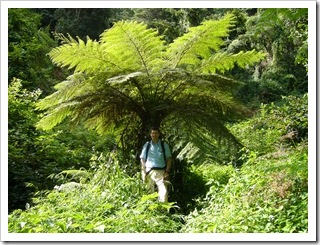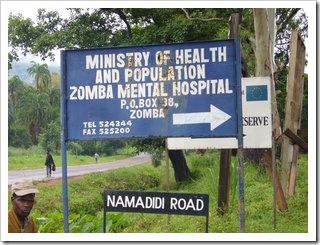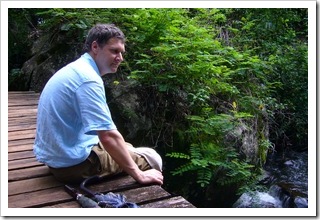Colin Dewar is a consultant psychiatrist and friend from Falkirk in Scotland, who came to visit recently for ten days. I asked him if he wanted to contribute to my blog, and I’m delighted to say that he agreed! A new person’s eyes and observations are always interesting and welcome.
When people say that Malawi is a beautiful country they don’t say whether for mountains, lakes or plains, even though it has all of these. My first impression was of greenness, much of it from maize that surges from the ground during the rainy season. There are a few trees left after deforestation, wherever the land is not cultivated, as on a few rocky hillocks where goats graze. 
But the main thing that takes up the space not used by people is the tall grass between the fields of maize and along the roadsides. The effect after a rain shower is of plains as far as the eye can see of shimmering green with a sudden hill budding from the land then vaster plains and another hill improbably far away and then another further still. During the rainy season clouds boil overhead, charcoal-grey and atomic, piled high as the sky into the vast sunlight pouring from above. The sky seems bigger in Africa and the sun when it does come burns the pale European skin in minutes and turns the deepest puddles to vapour in an afternoon.
 I was impressed by the appearance of Zomba Mental Hospital in that it seemed so tidy. The grounds are not extensive but well maintained by the people that work there. Frangipani trees shed occasional flowers onto swathes of Bermuda grass. Against the red brick walls of wards the clinical officers and nurses stand out in spruce, white uniforms. In the whole time I was there, I never saw a stain or a single button out of place. There is almost a preoccupation with hygiene as the floors of every corridor are mopped with disinfectant on a frequent basis. I must say that whilst the facilities for patients are basic, there is a sense that the members of staff work hard with the resources that they do have. Inside the wards there is a degree of crowding and it is remarkable that so many mentally ill people are contained to the extent that they are. You can smell humanity and the feel the press of humanity as you move among them. The threshold for admission is high. Only people who are very disturbed in their behaviour are brought by relatives for admission. It’s a last resort and the expectation is that if they were not admitted there would be grave consequences to the individual through self-neglect as well as for the rest of the community. Once people are sufficiently improved they graduate onto a quieter ward in preparation for discharge. My colleague Dr Gareth Nortje impressed me with his energy, and seemed dedicated in his efforts to support the psychiatric services where he could, with emphasis on capacity-building rather than gap-filling. He is an asset to the SMMHEP programme. There are aspects of practice at Zomba hospital which can be improved even without additional resources, the shortfall being more attributable to enthusiasm and lack of training than lack of care and our goal was to suggest where things could be changed to improve the quality of life for patients, with due sensitivity to local ways of doing things. Some of these issues were brought up and discussed as a small part of our teaching sessions. It was often the case that the difficulties were more substantial than they appeared at first and that local solutions were already being considered, and it was a great privilege to be invited to take part in the discussion.
I was impressed by the appearance of Zomba Mental Hospital in that it seemed so tidy. The grounds are not extensive but well maintained by the people that work there. Frangipani trees shed occasional flowers onto swathes of Bermuda grass. Against the red brick walls of wards the clinical officers and nurses stand out in spruce, white uniforms. In the whole time I was there, I never saw a stain or a single button out of place. There is almost a preoccupation with hygiene as the floors of every corridor are mopped with disinfectant on a frequent basis. I must say that whilst the facilities for patients are basic, there is a sense that the members of staff work hard with the resources that they do have. Inside the wards there is a degree of crowding and it is remarkable that so many mentally ill people are contained to the extent that they are. You can smell humanity and the feel the press of humanity as you move among them. The threshold for admission is high. Only people who are very disturbed in their behaviour are brought by relatives for admission. It’s a last resort and the expectation is that if they were not admitted there would be grave consequences to the individual through self-neglect as well as for the rest of the community. Once people are sufficiently improved they graduate onto a quieter ward in preparation for discharge. My colleague Dr Gareth Nortje impressed me with his energy, and seemed dedicated in his efforts to support the psychiatric services where he could, with emphasis on capacity-building rather than gap-filling. He is an asset to the SMMHEP programme. There are aspects of practice at Zomba hospital which can be improved even without additional resources, the shortfall being more attributable to enthusiasm and lack of training than lack of care and our goal was to suggest where things could be changed to improve the quality of life for patients, with due sensitivity to local ways of doing things. Some of these issues were brought up and discussed as a small part of our teaching sessions. It was often the case that the difficulties were more substantial than they appeared at first and that local solutions were already being considered, and it was a great privilege to be invited to take part in the discussion.
Many thanks Colin. For some pictures of the greening of Malawi, visit this new post.
 Colin on bridge at the peaceful Zomba Botanic Gardens Colin on bridge at the peaceful Zomba Botanic Gardens |
Leave a comment